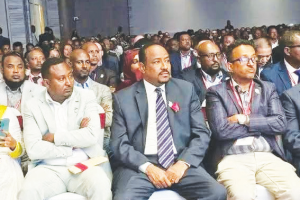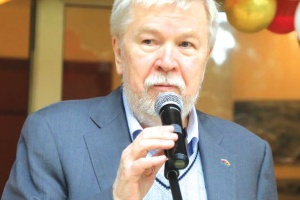
Had I been in the business of making movies for a living, my preferred theme for a descent film could have been something like “No Return from Hell”, the story of an innocent man suspected of terrorist activities who lands in the once notorious and now defunct “Makelawi” detention center where he is tortured until he admits he is a terrorist, while he is not, and dies soon afterwards from his wounds.
My fictional character has no name and no face but he is emblematic of the hundreds or thousands of inmates who passed through the gate of that notorious place. His tormentor is a veteran “freedom fighter” who is the chief torturer at Makelawi and ends up a real lunatic as he is also the victim of the system that relies on arbitrary detentions, tortures and false confessions.
He could not simply bear the daily psychological torments that he endures knowing deep down that the guys he tortures are not criminals. He simply succumbs from his mental wounds. The morale of the film? Well, everybody, both the torturer and the tortured, are bound to be losers in such a system. The lesson? It is clear that such a system has to be dismantled and laid to rest for good.
Nothing like Makelawi should be allowed to exist anymore in this country, in whatever form and for whatever purpose and reason. You can outlaw torture and close down torture centers until they appear in a new form, at a new place and under a new historical circumstance. The fact that the Russian Gulag was dismantled after Stalin’s death did not rule out the existence of the KGB and NKVD prisons built in the heart of Moscow and survived so many communist regimes.
The most notorious prison in Moscow that used to house dissidents is now home for alleged terrorists and other criminals, including opponents of the Putin regime. This is true despite the fact that so many films have been produced and books written that denounced the prison system in “modern” Russia. I am afraid our Makelawi might also reappear in another form sometime in the future because no State seems to exist without torturing and killing its citizens. The pretexts for repression may change but the victims are always the same innocent human beings.
It is a pity that Ethiopian cinema is not alive and kicking enough to capture such historic moments as we are now passing through to produce something worth seeing. The closing down of the most notorious prison in the history of Ethiopia should have inspired artists and writers to explore its past and pass it over to posterity so that the coming generations might learn something from it.
The premises of Makelawi are now serving as temporary shelters for the displaced persons in the September 2018 ethnic clashes around Addis Ababa. The setting of my imaginary “No Return from Hell” could thus be the same premises that could be filled with the same people who are using it as a shelter now. They could be the extras that would have played the role of prisoners at my fictional Makelawi. Even the lead actor could emerge from among the hundreds of refugees who have stared violence in the face and have been the victims of false allegations.
We remember how veteran and leading film maker Haile Gerima, also famous for speaking his mind in public, has trained the superb actors who played some key roles in his classic film “Tesza” (Dew) and gave it an authentically Ethiopian character, flair or atmosphere without mentioning the genius of his cinematography. He virtually coached amateurs to play the roles worthy of professional actors.
The film was shown to much domestic and international acclaim, winning prestigious international prizes. Tesza has lifted the bar of film quality in Ethiopia far higher and no film maker has so far reached that level. And this is despite the fact that the script suffered from episodes of narrative implausibility. Haile Gerima aside, it is a pity that we are not good enough or willing enough, to remember or tell about our tragedies or to laugh at them or even cry over our miseries.
We are often the victims of State terror and we don’t want to say anything about it even after the facts are revealed, like in my fictional Makelawi story. We rather wait until others, and mostly foreigners, tell us about our own misfortunes. Haile Gerima might be an exception to the rule. He has played his part in exploring another episode of collective shame through “Tesza” although his failure to grasp the true story of the Derg terror is something that can be attributed to the disadvantage of distance.
The director did not live here to witness some of the gruesome aspects of the so-called Red Terror. You may remember about the two Swedish journalists who served time at Makelawi after they were allegedly accused of terrorism or entering the country through Ogaden without a visa. The two journalists, Yohann Persons and Martin Schibbye were accused of helping and abetting the ONLF and labeled as terrorists until they were forced to make false confessions and a request for clemency as a precondition for their release.
What was ridiculous about all this was that their request for clemency was drafted and edited by the then Ethiopian strongman Meles Zenawi, who is portrayed in the book as a past master in the cynical game of wearing the three hats of prosecutor, jury and then pardoner. The two Swedish journalists did not go away silently after they were released. They displayed remarkable moral and professional integrity while they were in the notorious Makelawi and endured a yearlong torment with equally remarkable courage and humor.
And when they were out and gained their freedom, they wrote a book about their experience not only in Makelawi but also about the circumstances of their arrests and the negotiations for the release. The book is called 438 Days in the Prison of the Dictator”. As a result of their work, those of us who never set foot in Makelawi could get a glimpse of the hell it was. It is my guess that their account, whether written or verbal, might have had some indirect influence or impact on the decision or announcement by the ruling party to “make Makelawi history”.
To our surprise the two Swedish youngsters have turned their account into a film that is recently released in Sweden to critical acclaim. The good news is that this has coincided with the translation of the book, “438 Days in the Prison of the Dictator” by Mekonnen Gebregzi, a writer whose latest novel is called, “Fikir Bezemene Shibir” (Love in the Time of Terror) and set during Colonel Mengistu Hailemariam’s Terror years.
The translation of “438 Days” will soon be published and I hope readers will get a full view of what the Swedish journalists endured but also how our own compatriots suffered and survived in that of Makelawi. There was some distortion on the part of the ruling party when it made the announcement to close down the detention center. It said that the Makelawi was established by the Derg without mentioning the fact that it mainly served the EPRDF in its 27 year rule of terror.
It was as if the existence of Makelawi was only known recently or as if it existed and operated secretly. Thousands if not tens of thousands inmates have walked through the gates of Makelawi, hundreds of them perishing within its compounds. We have so far seen only a glimpse of the detention centre’s life from the inside through recent accounts by inmates, some of whom were physically and psychologically scarred for the rest of their lives.
A full account of Makelawi may never appear unless writers, film makers and other artists contribute their share in exposing our inferno which is also our collective shame. The Germans explored for decades what was going on in the Nazi concentration camps in order to come to terms with their shame and say never again. A democratic Germany could only be built after the collective psychological healing that took place after the war.
The same can be said about the Stasi crimes that led to so much suffering and the fall of the Berlin Wall. Makelawi is our Wall and it has to be dismantled and pulled down literally and symbolically from our collective psyche and the pieces be kept as memorabilia for our future. Only then can we have the courage and moral legitimacy to build a democratic order.
As long as we hide our shame, this task would remain unfulfilled. Perhaps the coming “Truth and Reconciliation Conference” would be a test of our courage. And the arts can play their parts in the process by preserving our collective memory however unpleasant that might prove to be or however shocking they will certainly be felt by future generations.
The Ethiopian Herald, March 10/2019
BY MULUGETA GUDETA





